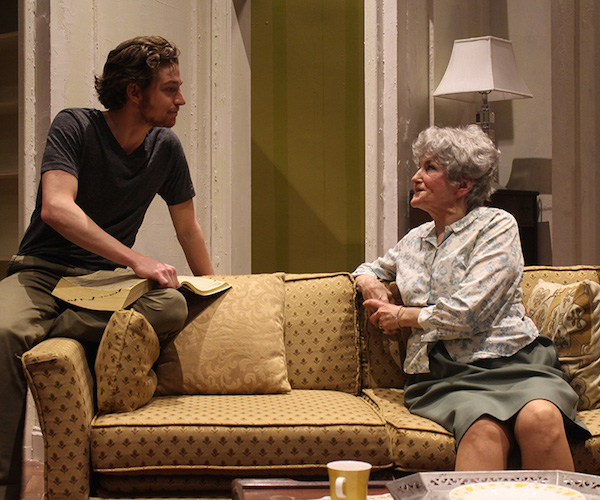Theater Review: “4000 Miles” — A Perceptive Look at the Generation Gap
4000 Miles is charming, insightful, and moving, an enjoyable anthropological study of contemporary American life across the generations.
4000 Miles by Amy Herzog. Directed by Nicole Ricciardi. Staged by Shakespeare & Company at the Elayne P. Bernstein Theatre, Lenox, MA, through July 16

Gregory Boover and Annette Miller in the Shakespeare & Company production of “4000 Miles.” Photo: courtesy of Shakespeare & Company.
By Helen Epstein
It’s Shakespeare & Company’s 40th anniversary season and the celebration kicks off with an impeccable production of Amy Herzog’s warm Obie-Award-winning comic drama. 4000 miles is a sequel to Herzog’s After the Revolution and a deeply personal tribute to her own grandmother. It is also an absorbing four-character play about inter-generational love, inter-generational conflict, changing yet enduring politics, and cultural norms.
John McDermott’s hyper-realistic set – a Manhattan living room featuring cozy, aged, and unmatched furnishings along with a scuffed front door with triple locks – is informative and deeply satisfying. Every detail is a marvel of fidelity to an era that has become an indelible part of New York and twentieth century American history.
The play opens with Leo Joseph-Connell arriving at the front door. It is 3 a.m. and he has come cross-country from Seattle by bicycle, waking his step-grand-mother Vera Joseph from a deep sleep. Leo is 21 and a hipster millennial; Vera is 91 and Old Left. As performed by the perfectly cast Gregory Boover and Annette Miller, the distance between them, as well as their familial chemistry, is palpable. After finding her dentures, ascertaining that Leo is not high, and that he will take a shower, smart, no-nonsense Vera agrees to let Leo crash with her for a while.
Herzog’s deft, understated script is character-driven and unfolds slowly, with many small, delightful turns as well as a few harrowing revelations, evoked or recalled. There’s the death of Leo’s best friend and his estrangement from his mother; Vera’s take on her own marriages and the marriage of Leo’s parents. This is a quiet, intimate play whose moments of great fun draw audiences into provocative conversations that take place among Leo, his grandmother, his girlfriend, and an abortive one-night-stand. These dialogues move into unexpected places and address thorny issues of age, the varieties of love, sex, politics, and family entanglements.
Director Nicole Ricciardi has assembled a perfect cast and design team. At times you are convinced that you are sitting in a living room in Manhattan instead of in a black-box theater in the Berkshires. The costume design by Stella Schwartz – Leo and his girlfriend Bec outfitted in outdoor clothing and gear, Vera in indoor granny blouses, skirts, shoes, and jewelry, art student Amanda in a wild combo of contemporary attire – provides plenty of amusement as well as social commentary. The sound design by Amy Altadonna is effective without being obtrusive, as is the lighting by James W. Bilnoski.
Veteran Shakespeare & Co. actor Annette Miller, who has portrayed such real life women as Golda Meir and Martha Mitchell for the company, gives us a Vera who could have easily lapsed into schmaltz but, instead, hits all the right tough/tender notes. Miller attends adroitly to the minutiae of Vera’s life, from the rhythms of her speech to the ways the “octogenarian,” as she calls herself, takes the laundry down to the basement in her felt slippers, searches for elusive words, reconsiders her cherished political views, and fiddles with her hearing aid. Boover, whom I was seeing for the first time, serves as her equally strong acting counterpart; every gesture and remark of this college drop-out speaks the 21st century. He refers to his mother as “Jane.”
When Leo explains to his grandmother how he and his friend found free food and lodging as they biked across the country, Vera responds that, surely, it would not have been as easy had they been women. He responds with unconscious sanctimony, “I find that if you approach people with love and trust you get the same thing back from them.”
“What is that?” Vera snaps back before she can help herself. “Confucius?”
Later on, Leo asks his grandmother whether his parents were ever in love. “I think in the beginning,” she answers. “He made her stop worrying.”
The contrast (and considerable distance) between these two closely-observed lead characters — their age, points of view, habits, styles, and elemental assumptions — are a continual source of pleasure in 4000 Miles. As is the fact that Herzog has written two vibrant supportive roles for women – one specifically for a Chinese actress whose understanding of Communism is very different from that of Leo and Vera.
For some theatergoers, this chamber play may seem on the sedate side. I found it charming, insightful, and moving, an enjoyable anthropological study of contemporary American life across the generations.
Helen Epstein is the author, co-author, editor or translator of ten books of non-fiction. She e-publishes classics of non-fiction with Patrick Mehr here.
Tagged: 4000 Miles, Amy Herzog, Annette Miller, Culture Vulture, Gregory Boover
